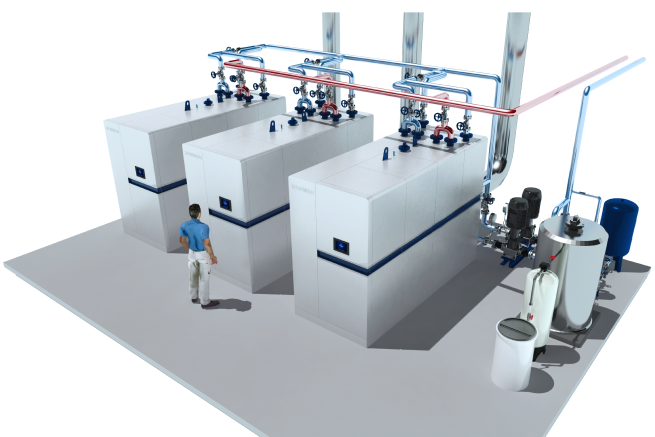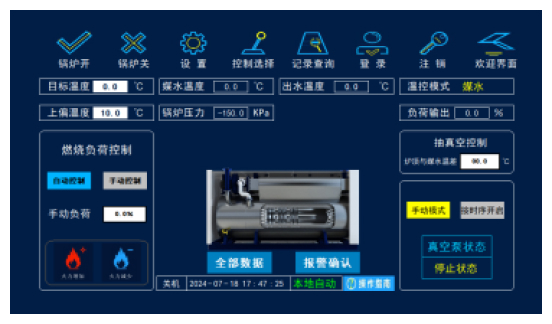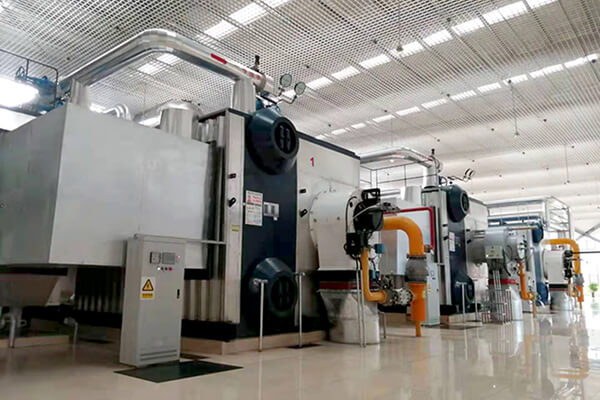What Is a Modular Boiler?
A modular boiler is not one big boiler but a coordinated bank of smaller boiler “modules” that operate together as a single plant. Each module is a complete, independently functioning boiler; a central controller staggers their start/stop and load-sharing so the total steam or hot-water output precisely matches demand. This design contrasts with a single large boiler that must cycle or run part-loaded to follow changing loads.
Modular Boiler Components
A modular boiler installation looks like several compact boilers wired and piped into a common system. Typical elements include:
-
Multiple boiler modules (burner, combustion chamber, heat-exchanger in each).
-
Master controller / PLC for load sequencing and monitoring.
-
Common feedwater treatment and feedwater pumps, economizer (optional), blowdown and condensate return piping.
-
Primary/secondary pumping or flow control to prevent unwanted flow-through of inactive modules.
How a Modular Boiler Works
Modular boiler main controller operation interface (supports Chinese and English bilingual switching)
When demand rises the controller brings modules online one at a time (or stages burners) so that output increases in near-linear steps. During low demand, only a single module or part of the bank runs — avoiding the inefficiency and standby losses of a large boiler running at low load. Modules can be hot-started quickly (many modern modular designs reach operating steam in minutes), and individual units can be serviced while the rest of the bank continues operating, giving inherent redundancy and uptime benefits.
Modular Boilers vs. Single Large Boiler — Cost Comparison
| Comparison Item | Winner | Modular (short) | Single Large (short) |
|---|---|---|---|
| Typical capital cost (equipment) | Single | Higher per kW (multiple packaged units) | Lower per kW (one large vessel) |
| Installation & commissioning | Modular | Factory-built, faster onsite hookup | More field work, longer assembly |
| On-site labor & disruption | Modular | Less heavy handling, less shutdown | Requires rigging/welding, more disruption |
| Part-load efficiency | Modular | Run only needed modules → better efficiency | Less efficient at low load |
| Fuel operating cost (variable load) | Modular | Generally lower with fluctuating demand | Higher when operating part-load |
| Maintenance complexity | Single | More identical units → more routine checks | Fewer service points, simpler schedule |
| Redundancy / uptime | Modular | High — one module offline rarely stops plant | Low — single point of failure |
| Scalability / future expansion | Modular | Easily add modules as demand grows | Major retrofit or replacement needed |
| Footprint & plant-room access | Modular | Smaller pieces, easier handling in tight spaces | Large unit needs crane and big space |
| Control complexity | Single | Needs good sequencing & hydraulics | Relatively simple control |
| Lifecycle total cost (TCO) | Depends | Often lower for variable loads (fuel + uptime) | Often lower for constant full-load operations |
| Typical payback behavior | Modular (if load varies) | Faster payback with fluctuating demand & high fuel cost | Slower payback but lower initial capex |
| Best-fit scenarios | Modular (most variable/critical cases) | Campuses, hospitals, batch plants, hotels, laundries | Large continuous 24/7 process plants |
Case Study – Lishui Wanda Wyndham Grand Hotel
The Lishui Wanda Wyndham Grand Hotel adopted a modular boiler system with four 2.8 MW vacuum hot-water units.
The system was designed to match variable hotel demand, with cascade control allowing 1–2 boilers to handle base load and all four for peak periods. Factory-assembled modules reduced installation time, while redundancy ensured uninterrupted service during maintenance. After commissioning, the hotel reported lower fuel consumption, higher operational flexibility, and stable hot-water supply, even during seasonal load fluctuations. This case highlights how modular systems deliver both energy efficiency and reliability in the hospitality sector.
Modular Boiler Advantages and Disadvantages
Advantages
-
Better part-load efficiency and reduced fuel use when demand fluctuates.
-
Built-in redundancy: one unit can be offline for service without losing full capacity.
-
Smaller footprint per module and easier staged plant expansion.
-
Faster factory assembly and reduced field installation time (less downtime to replace or upgrade).
Disadvantages / cautions
-
More individual components → potentially more routine service points.
-
Poor control or incorrect hydraulics (e.g., missing primary/secondary flow control) can cause short-cycling or flow-through issues that hurt efficiency; good system design and controls are essential.
-
For constant high continuous loads, the premium paid for multiple modules may not be recovered.
Which Industries & Applications Fit Modular Boiler Systems?
Modular Boilers – NSZS Water Tube Steam Boilers
Modular boilers are a strong fit where load varies or reliability and uptime are critical, for example:
-
Hospitals, universities and large campuses with variable daily schedules.
-
Food & beverage, pharmaceutical, and chemical plants where process steam demand fluctuates by shift or batch.
-
Hotels, commercial buildings, and laundries where peak times differ from baseload.
They’re also used where quick replacement/expansion is required or where plant room access is limited and factory-assembled modules simplify installation.
Do I Need a Modular Boiler? (How to Decide)
Ask about your actual operating profile and priorities:
-
Load variability: Do you have large swings in daily/weekly demand? If yes, modular often pays back.
-
Uptime requirement: Is forced downtime extremely costly? Redundancy from modules reduces risk.
-
Space & installation constraints: Is minimizing on-site assembly important? Modular packages can shorten installations.
-
Total cost of ownership modelling: Compare fuel use, maintenance, and downtime costs over expected life (not just purchase price). Consider getting vendor proposals with modeled fuel and maintenance figures.
If your plant runs near-constant full load 24/7 and redundancy isn’t important, a single large, efficient boiler might remain the best economic choice. If you have variable demand, service constraints, or need fast ramping, modular is often superior.
Conclusion
Modular boilers are a modern alternative to single large boilers that trade slightly higher equipment complexity for operational flexibility, improved part-load efficiency, easier expansion and better plant uptime. The correct choice depends on your load profile, uptime priorities, space and installation constraints, and a careful lifecycle cost comparison. Thoughtful system hydraulics and control strategy are crucial — a poorly designed modular plant can underperform. Not sure which modular boiler system is right for your facility? Contact our technical team today for a customized solution based on your actual load profile and long-term operating goals.
FAQ
Q: How fast do modular boilers start?
A: Many modern modular hot-water or steam modules can be hot-started in minutes, which reduces warm-up losses vs a large boiler. Exact time depends on model.
Q: Can I add modules later if my demand grows?
A: Yes — one of modular design’s strengths is staged expansion by adding modules without major rebuilds.
Q: Are modular boilers more efficient?
A: They’re often more efficient in practice for variable loads because the controller can run only what is needed and avoid low-load inefficiencies. For constant loads, efficiency gains may be smaller.
Q: What are the water treatment implications?
A: Water treatment and blowdown practices remain important; multiple boilers don’t remove the need for good feedwater treatment — in some cases, proper control is even more important to avoid uneven flows between modules.
Q: Is maintenance simpler or harder?
A: You’ll have more identical service points (filters, burner checks, valves), but the ability to take one module offline while others run often reduces operational disruption. Overall maintenance effort vs a single boiler depends on plant size and vendor support.
Get your best price
Quickly compare 3 FREE quotes
- Engineer quick quote
- The overall delivery speed is fast
- Financial choice
- Low installation costs and cost savings
25 years+ of boiler R&D
More than 20 innovative technologies



